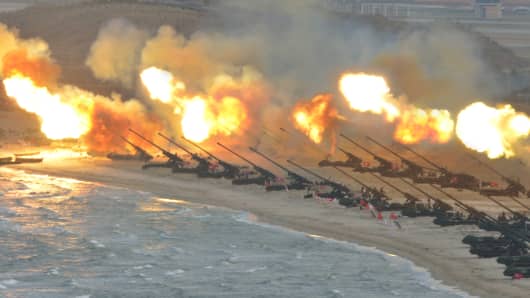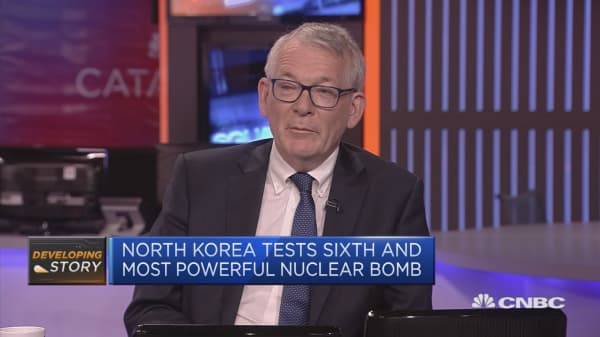News reports suggest many U.S. hedge fund managers have simply dismissed the pledge of peace and order on the Korean Peninsula issued by the Chinese Defense Ministry last Thursday.
Trading and investment experts continue to worry about the Korean military standoff, and they have also raised a caution flag on asset values in 40 percent of the world economy — countries that would be directly affected by a looming conflagration.
In an environment of confusion and bellicose rhetoric, it is perhaps normal that people known for their daring market bets should be erring on the side of prudence. What else is there to do when the White House says that the time for talk with North Korea is over, while the Pentagon urges diplomatic efforts, and a British military analyst, writing for a major Western newswire, doubts whether the U.S. would be able to intercept Pyongyang's missiles.
But this is more important: Beijing's categorical statement that it would not tolerate disorder and military hostilities in its neighborhood is at odds with its long-standing assurances that its influence with North Korea is limited.
Indeed, the logic of last week's statement implies quite the opposite: China, it now seems, claims an absolute control over North Korea and asserts its ability to control all other would-be belligerents — the U.S., Japan and South Korea.
If that's what the hedge funds see, their apparent indifference to Beijing's bravado is well taken.
Nukes and Asian designs
The problem won't go away, though. The lingering threat of a major military clash will continue to unsettle the financial markets for the foreseeable future simply because there is no reasonable prospect of a diplomatic solution.
Briefly, Pyongyang considers its nuclear — and its claimed much more powerful thermonuclear — arms and their delivery vehicles its only life insurance. But the U.S. wants that insurance policy irrevocably and verifiably cancelled before coming to the negotiating table. That's the essence of the Korean issue.
The rest — such as trading the suspension of nuclear and ballistic missile tests against the suspension of U.S.-South Korean military exercises — are diversions from North Korea's nuclear disarmament.
What's the way out of this impasse? The U.S., Japan and South Korea believe that sanctions could force Pyongyang to get rid of its nuclear arms and ballistic missiles.
But that is another impasse because for China and Russia the sanctions regime imposed by the United Nations Security Council has been exhausted, and they vehemently oppose any further multilateral or unilateral steps to strangle the North Korean economy.
Since there is no military solution to the problem that would not cause a regional or global Armageddon, the logic would require some understanding among the U.S., China and Russia on the key features of a possible peace settlement.
That is another pipe dream.
The U.S. and China are engaged in a fight for Asia. Beijing sees the departure of American troops from South Korea as a solution to the Korean problem, and American patrols in the South China Sea as flagrant violations of China's territorial integrity. In Beijing's view, wide-ranging and intensifying American-Chinese trade disputes are only part of America's attempt to contain China.
U.S. relations with Russia are even worse. Washington and Moscow keep going at each other all over the map.
Inflation should also be a fear factor
How in the world, under these circumstances, can there be any real possibility for the U.S., China and Russia to close a sad World War II chapter? Remember, after three years of fighting, the U.S. decided to sign an armistice in July 1953 with a North Korea backed up by an impoverished China and a devastated Russia virtually bled to death by Hitler's Germany.
The world, therefore, is still looking at an open war theater — a real time bomb that is justifiably causing serious security concerns.
Whether the widely reported portfolio shifts into cash have something to do with that is an open question, but the enduring allure of the U.S. bond market certainly reflects a heightened perception of political and economic risks affecting the investment environment.
Investors are willing to lend money to Uncle Sam at negative or zero real interest rates on IOUs of up to five years of maturity, and they seem happy even with a puny 0.5 percent real return on the Treasury's benchmark 10-year note.
Remarkably, the U.S. government is getting 10- and 30-year money at nominal interest rates of 2.17 percent and 2.78 percent — even though it is obvious, and the oracles keep repeating that rising inflation is the only way out of America's soaring public sector liabilities.
Sure, people are lending to a AAA borrower, but they are ignoring its rising budget deficits (5 percent of GDP), public debt ($20 trillion, and counting, or 104 percent of GDP at this writing) and absence of any credible policies to stop and reverse America's increasing recourse to global savings and the Fed's printing presses.
Open-ended military confrontations in East Asia, Middle East and Europe will make the American fiscal situation even more untenable, and will most probably solve none of the underlying issues that require diplomacy and stable political arrangements.
Investment thoughts
China's pledge that it won't allow war and chaos on its doorstep sounds like a metaphysical musing in the presence of hostile military forces conducting live fire operations, nuclear tests and missile launches over sovereign nations.
Incantations about the virtues of patient dialogue and win-win cooperation are not finding any takers in the Korean crisis. Beijing's own pressure on South Korea, dire warnings to Japan about its military buildup and constant skirmishes with U.S. air and naval assets around its maritime borders are all eloquent proofs that a meaningful political discussion has broken down.
Advocating a dialogue while pursuing the logic of war are dangerous delusions fraught with unacceptable risks of accidents and miscalculations.
U.S. investment professionals are right about their caution flags. The world is on the verge of war in Northeast Asia.
I continue to maintain that equities are the best short-term and long-term investment bets. The unrivaled breadth of U.S. stock markets offers excellent opportunities to design portfolios that would fit a broad variety of risk profiles and investment horizons.
Commentary by Michael Ivanovitch, an independent analyst focusing on world economy, geopolitics and investment strategy. He served as a senior economist at the OECD in Paris, international economist at the Federal Reserve Bank of New York, and taught economics at Columbia Business School.
For more insight from CNBC contributors, follow @CNBCopinion on Twitter.






